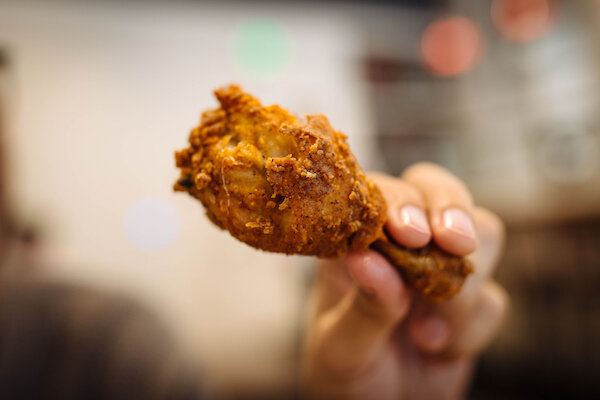Weekly IP Buzz for the Week Ending September 25, 2020
In this week's post, we see that while app users expect certain apps will be accessing their camera and location to run, app notifications could provide insight to use that is unexpected or unauthorized, and alert consumers to update their app preferences or read the app policies and terms of use.
And, sometimes environmental situations can affect the appropriateness of certain trademark use. Brand owners seeking to maintain rights for future use may need to find creative ways to try to maintain rights in their marks. Example: KFC and "Finger Lickin' Good".
Plus, Tik Tok has been under scrutiny for many legitimate reasons, but consumers should understand and be mindful that most apps do access user private data, store it, and use it for various reasons.
Do You Read All You App Notifications? They Could Be Warning of Unauthorized Data Access
As cell phones have become ubiquitous, many may not pay attention to app notifications on their phone, having turned them off or having become used to “clearing” all notifications without a second thought. Sometimes, however, those app notifications may warrant further review.
For example, Instagram users recently sued Instagram’s parent company, Facebook, alleging violations of privacy that stemmed from Instagram’s use of users’ cellphone cameras even when the application was not using the camera directly. When users sign up for Instagram’s services, the application asks for access to the cell phone’s camera, folders, and location services. This is not uncommon as most photograph-sharing services will ask for access to a cell phone’s user’s camera, folders, and location services in order to operate. Specifically, Instagram asks for such permissions in order to: allow the user to take photos within the application; save and upload photographs; and, in order to allow the user to tag the geographical location at which the photograph was taken. A lawsuit against Facebook was filed after users received app notifications about such access that wasn’t expressly authorized.
Read the full article here.
When Intellectual Property Suddenly Sends the Wrong Message: Is Your Slogan COVID-Appropriate?
COVID-19 has certainly infiltrated all areas of the marketplace, often in unexpected ways. In recent weeks, KFC announced that it will be suspending its “Finger Lickin' Good” tagline temporarily, since “finger lickin'” may not be the best advice given the global pandemic and CDC guidelines intended to slow the spread of COVID-19.
KFC, which is owned by Yum! Brands, was widely criticized in the early stages of the pandemic for an ad released in its online and United Kingdom markets featuring dozens of people licking their own—and each other’s—fingers. The ad received swift backlash as “irresponsible” and “encouraging behavior that would increase the spread of COVID-19.” Although known for its irreverent humor, KFC has since confirmed that it removed its famous 64-year old tagline from U.S. markets in March 2020. Since then, a new ad running on YouTube and in KFC markets globally features billboards and buckets of chicken with the famous slogan blurred and admonishing: “That thing we always say? Ignore it. For now.”
While the new campaign is humorous, it highlights an important consideration for companies with regard to intellectual property, as identified by Catherine Tan-Gillespie, global Chief Marketing Officer for KFC: “We find ourselves in a unique situation—having an iconic slogan that doesn’t quite fit the current environment.”
Find the article here.
Tik Tok Claims the Same Privacy Protections as Facebook – But is That Really the Gold Standard?
Privacy concerns regarding the popular short-video social network, Tik Tok, have gone viral in recent weeks. In July, Secretary of State Mike Pompeo said the U.S. was considering banning Tik Tok because it places consumers’ “private information in the hands of the Chinese Communist Party.” Days later, the Democratic National Committee advised staffers not to use it. Even Tik Tok’s target demographic has balked, with gaming superstar Tyler “Ninja” Blevins announcing on July 9 that he had Tik Tok privacy concerns and would be deleting the app.
Personal technology and geopolitics have certainly become increasingly more intertwined. Last summer, India banned Tik Tok and several other Apps from China, citing security concerns. Similarly, many expressed concerns over Russian-made FaceApp, a program that takes photographs and “ages” people using artificial intelligence. So, what’s true and what’s hype?
It’s true that Tik Tok is owned by a Beijing-based company called ByteDance (although the app may be in the process of being sold), but the app is not available in China. And, Kevin Mayer, an American CEO formerly of Disney, was recently hired in an effort to improve the app’s optics. So, is Tik Tok really mining our data? And does the Chinese government really have access to that data?
Read more here.
Click to read the previous Weekly IP Buzz on Thriving Attorney.
For more posts, see our Intellectual Property Law Blog.
--------
In addition to Thriving Attorney, Darin M. Klemchuk is founder of Klemchuk LLP, a litigation, intellectual property, and transactional law firm located in Dallas, Texas. Click to read more about Darin Klemchuk's practice as an intellectual property lawyer.



